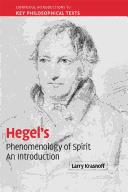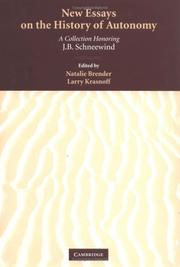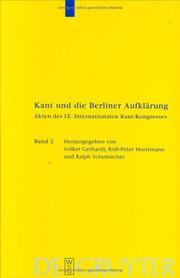| Listing 1 - 3 of 3 |
Sort by
|

ISBN: 9780521695374 9780521873574 9780511619892 9780511649950 0511649959 0511619898 0521873576 0521695376 1107181259 0511645864 1282395319 9786612395314 0511408129 0511573782 0511408935 Year: 2008 Publisher: Cambridge Cambridge University Press
Abstract | Keywords | Export | Availability | Bookmark
 Loading...
Loading...Choose an application
- Reference Manager
- EndNote
- RefWorks (Direct export to RefWorks)
This book introduces Hegel's best-known and most influential work, Phenomenology of Spirit, by interpreting it as a unified argument for a single philosophical claim: that human beings achieve their freedom through retrospective self-understanding. In clear, non-technical prose, Larry Krasnoff sets this claim in the context of the history of modern philosophy and shows how it is developed in the major sections of Hegel's text. The result is an accessible and engaging guide to one of the most complex and important works of nineteenth-century philosophy, which will be of interest to all students and teachers working in this area.
Consciousness --- Spirit --- Truth --- Conviction --- Belief and doubt --- Philosophy --- Skepticism --- Certainty --- Necessity (Philosophy) --- Pragmatism --- Pneuma --- Pneumatology (Philosophy) --- Pneumatology (Theology) --- Holy Spirit --- Soul --- Apperception --- Mind and body --- Perception --- Psychology --- Self --- Hegel, Georg Wilhelm Friedrich, --- Theory of knowledge --- Hegel, Georg W.F. --- Spirit. --- Consciousness. --- Truth. --- Arts and Humanities

ISBN: 052182835X 0511211104 9780511211102 9780521828352 0511216475 9780511216473 0511214685 9780511214684 9780511498039 0511498039 1280516054 9781280516054 1107147581 9781107147584 0511315260 9780511315268 0511212879 9780511212871 Year: 2004 Publisher: Cambridge Cambridge University Press
Abstract | Keywords | Export | Availability | Bookmark
 Loading...
Loading...Choose an application
- Reference Manager
- EndNote
- RefWorks (Direct export to RefWorks)
Kantian autonomy is often thought to be independent of time and place, but J. B. Schneewind in his landmark study, The Invention of Autonomy, has shown that there is much to be learned by setting Kant's moral philosophy in the context of the history of modern moral philosophy. The distinguished authors in the collection continue Schneewind's project by relating Kant's work to the historical context of his predecessors and to the empirical context of human agency. This will be a valuable resource for professionals and advanced students in philosophy, the history of ideas, and the history of political thought.
General ethics --- Kant, Immanuel --- Autonomy (Philosophy) --- Philosophy --- History --- History. --- Arts and Humanities


ISBN: 9783110874129 9783110169799 Year: 2014 Publisher: Berlin ;; Boston De Gruyter
Abstract | Keywords | Export | Availability | Bookmark
 Loading...
Loading...Choose an application
- Reference Manager
- EndNote
- RefWorks (Direct export to RefWorks)
| Listing 1 - 3 of 3 |
Sort by
|

 Search
Search Feedback
Feedback About UniCat
About UniCat  Help
Help News
News